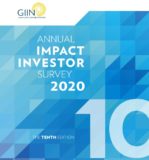
Bron
The GIIN
The Global Impact Investing Network (GIIN) published today the 10th edition of its Annual Impact Investor Survey, which finds the USD $715 billion global impact investing market maturing, even amid the worldwide pandemic. This year’s survey, the most comprehensive overview of the market, provides data and insights from the GIIN’s largest number of respondents ever: 294 of the world’s leading impact investors, who collectively manage USD $404 billion of impact investing assets.
Key findings include:
- Strong performance is motivating investment activity: One critical driver of market growth is the industry’s performance – in both impact and financial terms – over time. Eighty-eight percent of respondents report meeting or exceeding their financial expectations. In terms of impact performance, 99% of respondents noted that they have met or exceeded their
expectations since inception.
- “Sophistication of impact measurement and management practice” cited as one of the greatest areas of progress over the past decade: At the cornerstone of impact investing is the ability to translate intention into impact results. Impact measurement and management (IMM) practices enable impact investors to demonstrate real results and ensures accountability against impact washing. IMM practices now reflect greater sophistication and strategic use of tools. Despite this, as the market matures, opportunity still exists for greater depth and refinement, specially for impact performance comparison and verification of results.
- Interest in key sectors and geographies (excluding outliers): Top sectors to which respondents allocated capital were energy (16%), followed by financial services (excluding microfinance), with 12% of sample AUM. The majority of capital is allocated to developed markets (55%), with the top region of investment being US & Canada (30%). Top asset classes are private debt, comprising 21% of the sample AUM, while public equity accounts for 19%.
- Growth marked by 17% compound annual growth rate (CAGR) among repeat respondents: Among repeat respondents to the GIIN’s 2016 Annual Impact Investor Survey (2015 year-end data) and this year’s survey, aggregate AUM grew from USD $52 billion to $98 billion.
Within the context of the broader impact investing market, the 2020 Annual Impact Investor Survey only describes the assets of a respondent sample of 294 investors, and therefore does not represent the full market size. This year’s report, however, also includes an update to the market sizing figure provided in April 2019. “Last year, the GIIN took on an unprecedented effort to estimate the total size of the impact investing market. This year’s updated estimate of USD $715 billion improves upon the rigorous methodology of its previous figure with a strengthened database that includes over 1,700 impact investors,” said Dean Hand, GIIN’s Director of Research.
Given recent developments around the global coronavirus crisis, participating investors were also invited to share early reflections on the effects of COVID-19 on investment activity and outlook. Of the 294 respondents to this year’s survey, 122 offered specific perspectives on how COVID-19 might change their allocations and risk assessments going forward.
- While investment activity vacillation is to be expected in the face of COVID-19, most respondents (57%) indicated that they are ‘unlikely’ to change the volume of capital they had planned to commit to impact investments in 2020. While 20% are at least ‘somewhat likely’ to commit less capital than they had planned, 15% are ‘likely’ to commit more capital than
planned. - Almost half of respondents expect impact performance in line with their expectations, and 18% expect portfolios to outperform on impact. Sixteen percent expect underperformance on impact while 46% expect underperformance against financial expectations.
“The GIIN released its first Impact Investor Survey in 2010, amid the early aftereffects of the financial crisis. As we launch the 10th edition of our flagship report, we find ourselves at a time where the world is once again facing unprecedented challenges,” said Amit Bouri, Co-Founder and CEO of the GIIN. “Over the past decade, we have seen incredible growth and increased sophistication in impact investing. Despite challenges or perhaps because of them, many investors have, and will continue to turn to impact investing to contribute to social and environmental solutions. Investment capital has an important role to play in driving positive impact for our communities and planet, and I believe we’ll see even greater possibilities for what impact investing can achieve, in this moment, as well as in the years ahead.”



